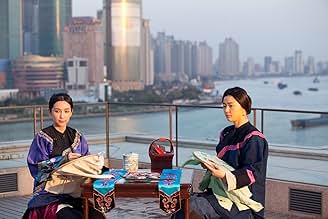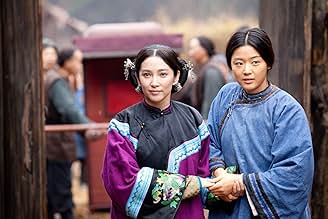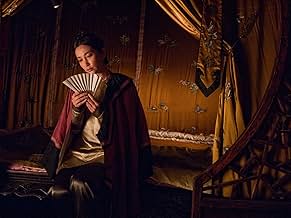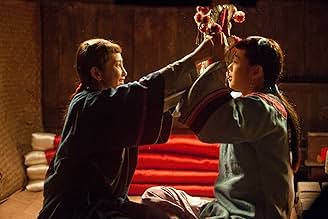ÉVALUATION IMDb
6,1/10
4,1 k
MA NOTE
Ajouter une intrigue dans votre langueA story set in nineteenth-century China and focusing on the life-long friendship between two girls who develop their own secret code as a way to contend with the rigid social norms imposed o... Tout lireA story set in nineteenth-century China and focusing on the life-long friendship between two girls who develop their own secret code as a way to contend with the rigid social norms imposed on women.A story set in nineteenth-century China and focusing on the life-long friendship between two girls who develop their own secret code as a way to contend with the rigid social norms imposed on women.
- Prix
- 3 victoires et 1 nomination au total
Jun Ji-hyun
- Snow Flower
- (as Gianna Jun)
- …
Hu Qing Yun
- Mrs. Liao
- (as Jingyun Hu)
Shiping Cao
- Mr. Wei
- (as Shi Ping Cao)
Avis en vedette
A film about laotong, the bonding of two women for eternity as kindred sisters, is unusual to say the least and one that is beautifully retold in the manner of so many oriental stories must be a rarity. The reason it works so well is because it is shot at two layers, one in the present day, and the other at a time when women needed each other for support. In fact the retelling of the latter is the result of a book written by Sophia of the life of Snow Flower in the title. In each layer Sophia/Snow Flower is bonded to Nina/Lily. The acting by Gianna Jun (Sophia/Snow Flower) and Bingbing Li as Nina/Lily is extraordinary with sterling support from an excellent cast. The cinematography and soundtrack are also first rate.
In essence the story explores love in many guises via the relationship of the two present day characters and their mirrors of old, but it is only at the conclusion of the film that we are allowed to be inside the minds of the kindred sisters and their relationship. This is not a film that pivots upon romantic love since it delves very deep into the agendas the women have and for that reason alone it may not be a commercial success. That shouldn't detract from its beauty as a work of art but clearly it has had an effect on the film's popularity on IMDb. And that is a shame because it is well worth lasting all of its one hundred and four minutes including the beautiful wash drawings displayed with the final credits.
I don't know how this film manages less than six on the ratings for I feel a little mean in only giving it eight because of the material it explores. It is worthy of a visit to cinema, or even ownership of a DVD. Oriental cinema has made another worthy addition to its growing list of excellent stories turned into film.
In essence the story explores love in many guises via the relationship of the two present day characters and their mirrors of old, but it is only at the conclusion of the film that we are allowed to be inside the minds of the kindred sisters and their relationship. This is not a film that pivots upon romantic love since it delves very deep into the agendas the women have and for that reason alone it may not be a commercial success. That shouldn't detract from its beauty as a work of art but clearly it has had an effect on the film's popularity on IMDb. And that is a shame because it is well worth lasting all of its one hundred and four minutes including the beautiful wash drawings displayed with the final credits.
I don't know how this film manages less than six on the ratings for I feel a little mean in only giving it eight because of the material it explores. It is worthy of a visit to cinema, or even ownership of a DVD. Oriental cinema has made another worthy addition to its growing list of excellent stories turned into film.
This is a well cast and nicely filmed but uneven movie. The 2 leads Li Bing Bing and Gianna Jun are lovely in different ways. Only Asian actresses could play the same characters as teens and in their 30s convincingly.
The story concerns two pairs of best girl friends, one set in present day and one pair set in the mid 1800s in China. The modern story is a bit less interesting than the modern one. The 1800s story has bound feet (ouch), civil war and rural poverty. The modern story is about career and love with a foreigner (an unintentionally hilarious Hugh Jackman - that song!).
The changes between the 2 stories are a bit too frequent. It isn't confusing about who is who but it just breaks up and jumbles the narrative a little too much.
The movie is a bit long and maudlin. With too many lingering sad looks. Feel like shouting Hurry Up sometimes! That is the old fashioned Chinese soap opera part of it.
Overall worth one watch.
The story concerns two pairs of best girl friends, one set in present day and one pair set in the mid 1800s in China. The modern story is a bit less interesting than the modern one. The 1800s story has bound feet (ouch), civil war and rural poverty. The modern story is about career and love with a foreigner (an unintentionally hilarious Hugh Jackman - that song!).
The changes between the 2 stories are a bit too frequent. It isn't confusing about who is who but it just breaks up and jumbles the narrative a little too much.
The movie is a bit long and maudlin. With too many lingering sad looks. Feel like shouting Hurry Up sometimes! That is the old fashioned Chinese soap opera part of it.
Overall worth one watch.
Snow Flower parallels two friendships, but not very well. The older story of two girls that both had bound feet and by lautong is rich - but the film has trouble translating it into the modern day story.
I finished reading all the previous reviews to have a clear idea about what other people saw in this movie, and I must say that all that emphasis about the film being too different from the book doesn't show a great understanding of the cinematic technique. A movie is not a book. The visual, with long shots and close ups, the dialogue and the music, even the noises, take over all the written pages to express a single gesture, the full description of a landscape, or the design of a dress. A single close up can give us the essence of a full chapter.
This movie is sheer poetry.
Forget about the original book that helped to create this jewel of a movie, just watch this film, allow your senses to be absorbed by the two parallel stories --the contemporary and the historical-- and just absorb all that beauty offered to you in the story-line, the exquisite photography, the delicacy of sentiments expressed by these women (it is a terrible film for men's egos, because we come a very poor second compared with those women, overpowered by men's brutality and yet transcending the horrible handicaps imposed on them, like the tiding of their feet from early age, to convert them into defenseless crippled creatures, totally depending on men, and their virtual slaves for life).
The image of those bounded stomps, deformed to the point of becoming unrecognizable as human feet symbolizes too the humiliation some ultraconservative elements of society try to impose over minorities as if to say: "There, you'll go thru life bounded and suffering, freedom to be yourself will be denied to you because I want it so".
The total love among these "Sisters for life" was infinitely superior to the love these women could have had for their husbands. We see that in both cases --the historic and the contemporary-- and in both cases it lasted, strong, to the last consequences.
Contrary to other viewers, I didn't have the slightest problem in following the development of the two parallel stories, since it was done in a very natural, simple and honest way; both stories superbly intertwined to perfection till the final resolution.
¿A masterpiece? yes, I think so.
This movie is sheer poetry.
Forget about the original book that helped to create this jewel of a movie, just watch this film, allow your senses to be absorbed by the two parallel stories --the contemporary and the historical-- and just absorb all that beauty offered to you in the story-line, the exquisite photography, the delicacy of sentiments expressed by these women (it is a terrible film for men's egos, because we come a very poor second compared with those women, overpowered by men's brutality and yet transcending the horrible handicaps imposed on them, like the tiding of their feet from early age, to convert them into defenseless crippled creatures, totally depending on men, and their virtual slaves for life).
The image of those bounded stomps, deformed to the point of becoming unrecognizable as human feet symbolizes too the humiliation some ultraconservative elements of society try to impose over minorities as if to say: "There, you'll go thru life bounded and suffering, freedom to be yourself will be denied to you because I want it so".
The total love among these "Sisters for life" was infinitely superior to the love these women could have had for their husbands. We see that in both cases --the historic and the contemporary-- and in both cases it lasted, strong, to the last consequences.
Contrary to other viewers, I didn't have the slightest problem in following the development of the two parallel stories, since it was done in a very natural, simple and honest way; both stories superbly intertwined to perfection till the final resolution.
¿A masterpiece? yes, I think so.
SNOW FLOWER AND THE SECRET FAN is the cinematic adaptation of Lisa See's popular novel by writers Angela Workman, Ron Bass and Michael K. Ray and director Wayne Wang. The film unveils parallel stories between 19th century China and present day Shanghai - the tales of two women joined by laotong - a binding vow and contract to be eternal friends and share each others lives - communicating with a secret women's language called nu shu, carefully inked characters placed on the folds between the spines of a silken fan. By using the same actresses to play the parts of the girls two centuries apart adds a mysterious beauty to the films alluring flavor.
In 1826 Lily and Snow Flower become laotung and though they are from opposite ends of the social stratum they become devoted friends, undergoing the ritual of having their feet broken and bound to remain very small as adults - apparently a desired attribute for physical attraction as a potential bride. The poor girl is chosen for marriage by a wealthy family and the rich girl is promised to a butcher, an extreme reversal of roles in society and it is the manner in which each adapts and aids the other that demonstrates the depth of the bond of laotong. Concurrently in the film we meet Nina and Sophie in contemporary Shanghai: Nina has gained education and stature and is due to move to New York as part of an important business. Sophie is in an accident and only slowly do we realize that Sophie had the promise of moving to Australia to marry an Aussie singer (Hugh Jackman), more because she is pregnant than for love. Because of the laotung between Nina and Sophie the two make sacrifices that overcome all else to prove their loyalty. There are many parallels in the two stories that show a bond between the two sets of girls and to capture this bond securely the two girls form centuries apart are played by the same actresses: Lily/Nina become the roles of Bing Bing Li and Snow Flower/Sophie are portrayed by Gianna Jun. The supporting cast is carefully chosen and uniformly fine.
The sets and costumes and music enhance this film significantly. It is not a great epic of a movie, but it has a tender and touching story that is very well told by everyone involved.
Grady Harp
In 1826 Lily and Snow Flower become laotung and though they are from opposite ends of the social stratum they become devoted friends, undergoing the ritual of having their feet broken and bound to remain very small as adults - apparently a desired attribute for physical attraction as a potential bride. The poor girl is chosen for marriage by a wealthy family and the rich girl is promised to a butcher, an extreme reversal of roles in society and it is the manner in which each adapts and aids the other that demonstrates the depth of the bond of laotong. Concurrently in the film we meet Nina and Sophie in contemporary Shanghai: Nina has gained education and stature and is due to move to New York as part of an important business. Sophie is in an accident and only slowly do we realize that Sophie had the promise of moving to Australia to marry an Aussie singer (Hugh Jackman), more because she is pregnant than for love. Because of the laotung between Nina and Sophie the two make sacrifices that overcome all else to prove their loyalty. There are many parallels in the two stories that show a bond between the two sets of girls and to capture this bond securely the two girls form centuries apart are played by the same actresses: Lily/Nina become the roles of Bing Bing Li and Snow Flower/Sophie are portrayed by Gianna Jun. The supporting cast is carefully chosen and uniformly fine.
The sets and costumes and music enhance this film significantly. It is not a great epic of a movie, but it has a tender and touching story that is very well told by everyone involved.
Grady Harp
Le saviez-vous
- AnecdotesRupert Murdoch personally asked Fox Searchlight to release this film in North America.
- GaffesThe last paragraphs of the unsent letter that Nina found in Sophias apartment, which can be seen when she closes the notebook, don't match Nina's voice-over.
- ConnexionsReferenced in Conan: A Tree with Dutch Elm Disease Grows in Brooklyn (2011)
Meilleurs choix
Connectez-vous pour évaluer et surveiller les recommandations personnalisées
- How long is Snow Flower and the Secret Fan?Propulsé par Alexa
Détails
- Date de sortie
- Pays d’origine
- Site officiel
- Langues
- Aussi connu sous le nom de
- Snow Flower and the Secret Fan
- Lieux de tournage
- société de production
- Consultez plus de crédits d'entreprise sur IMDbPro
Box-office
- Budget
- 6 000 000 $ US (estimation)
- Brut – États-Unis et Canada
- 1 348 205 $ US
- Fin de semaine d'ouverture – États-Unis et Canada
- 134 005 $ US
- 17 juill. 2011
- Brut – à l'échelle mondiale
- 11 348 205 $ US
- Durée1 heure 44 minutes
- Couleur
- Mixage
- Rapport de forme
- 2.35 : 1
Contribuer à cette page
Suggérer une modification ou ajouter du contenu manquant

Lacune principale
What is the Spanish language plot outline for Fleur de neige et l'évantail secret (2011)?
Répondre
































